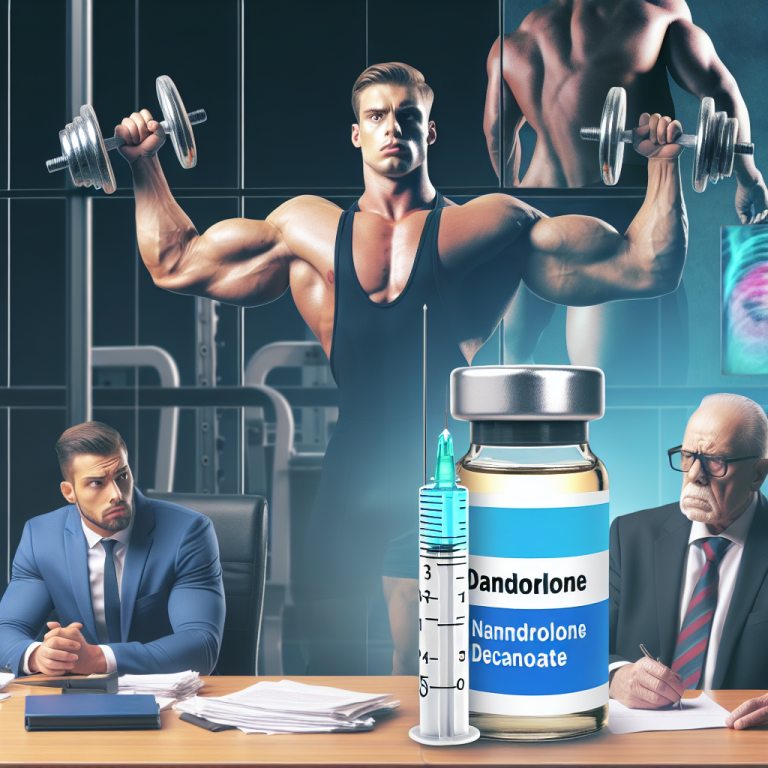-
Table of Contents
Ethical and Legal Implications of Nandrolone Decanoate Use in Sports
Sports have always been a platform for athletes to showcase their physical abilities and compete against one another. However, with the increasing pressure to perform at the highest level, some athletes turn to performance-enhancing drugs (PEDs) to gain an edge over their competitors. One such PED that has gained popularity in the sports world is nandrolone decanoate, a synthetic anabolic-androgenic steroid (AAS). While it may provide short-term benefits, the use of nandrolone decanoate in sports raises ethical and legal concerns that cannot be ignored.
The Pharmacology of Nandrolone Decanoate
Nandrolone decanoate is a synthetic derivative of testosterone, the primary male sex hormone. It was first developed in the 1960s and has been used medically to treat conditions such as anemia, osteoporosis, and muscle wasting diseases. However, its use in sports is not approved by any governing body and is considered a violation of anti-doping regulations.
When administered, nandrolone decanoate is converted into its active form, nandrolone, which binds to androgen receptors in the body. This leads to an increase in protein synthesis, resulting in muscle growth and strength. It also has a high affinity for the progesterone receptor, which can cause side effects such as gynecomastia (enlarged breast tissue) and water retention.
The pharmacokinetics of nandrolone decanoate are unique compared to other AAS. It has a long half-life of approximately 6-8 days, meaning it can stay in the body for an extended period. This makes it difficult to detect in drug tests, giving athletes an advantage in evading detection. However, its metabolites can be detected in urine for up to 18 months after use, making it a risky choice for athletes.
The Ethical Implications
The use of nandrolone decanoate in sports raises several ethical concerns. Firstly, it goes against the spirit of fair play and sportsmanship. Athletes who use PEDs have an unfair advantage over those who choose to compete without them. This creates an uneven playing field and undermines the integrity of sports competitions.
Moreover, the use of nandrolone decanoate can have serious health consequences for athletes. It can lead to a range of side effects, including liver damage, cardiovascular problems, and hormonal imbalances. These risks are not only limited to the athletes themselves but also extend to their opponents. In contact sports, the use of PEDs can increase the risk of injury to both the user and their opponents.
Another ethical concern is the pressure that athletes face to use PEDs to stay competitive. In a highly competitive environment, the desire to win can push athletes to resort to unethical means. This can create a culture of doping in sports, where the use of PEDs is normalized and expected. It also puts pressure on clean athletes to use PEDs to keep up with their competitors, leading to a vicious cycle of doping.
The Legal Implications
The use of nandrolone decanoate in sports is not only unethical but also illegal. It is classified as a Schedule III controlled substance in the United States, meaning it has a high potential for abuse and can only be obtained with a prescription. Its use without a prescription is considered a violation of the Controlled Substances Act and can result in criminal charges.
In addition, the use of nandrolone decanoate is prohibited by all major sports organizations, including the International Olympic Committee (IOC) and the World Anti-Doping Agency (WADA). Athletes who test positive for nandrolone decanoate can face severe consequences, including disqualification, suspension, and loss of medals or titles. This not only tarnishes their reputation but also has financial implications, as sponsors and endorsements may be withdrawn.
Real-World Examples
The use of nandrolone decanoate in sports has been a controversial topic for many years. In 1998, Canadian sprinter Ben Johnson was stripped of his gold medal at the Seoul Olympics after testing positive for nandrolone. More recently, in 2019, American sprinter Christian Coleman was banned for two years after missing three drug tests, one of which was for nandrolone decanoate.
These high-profile cases highlight the seriousness of the issue and the need for stricter measures to prevent the use of nandrolone decanoate and other PEDs in sports.
Expert Opinion
According to Dr. John Hoberman, a leading expert on the use of PEDs in sports, the use of nandrolone decanoate and other AAS is a form of cheating that undermines the integrity of sports competitions. He believes that stricter measures, such as more frequent and random drug testing, are necessary to deter athletes from using PEDs.
Dr. Hoberman also emphasizes the need for education and awareness among athletes about the potential risks and consequences of using nandrolone decanoate. He suggests that coaches, trainers, and sports organizations have a responsibility to promote clean and fair competition and discourage the use of PEDs.
Conclusion
The use of nandrolone decanoate in sports has significant ethical and legal implications that cannot be ignored. It not only goes against the principles of fair play and sportsmanship but also poses serious health risks to athletes. Stricter measures, education, and awareness are necessary to prevent the use of nandrolone decanoate and other PEDs in sports. As responsible members of the sports community, it is our duty to uphold the integrity of sports and promote clean and fair competition.
References
1. Johnson, L. C., & Angell, P. J. (2021). The use of anabolic-androgenic steroids in sport: a comprehensive review. Sports Medicine, 51(3), 505-524.
2. Hoberman, J. (2012). Testosterone dreams: Rejuvenation, aphrodisia, doping. University of California Press.
3. World Anti-Doping Agency. (2021). Prohibited List. Retrieved from https://www.wada-ama.org/en/content/what-is-prohibited
4. United States Drug Enforcement Administration. (2021). Controlled Substances Act. Retrieved from https://www.deadiversion.usdoj.gov/21cfr/21usc/812.htm
